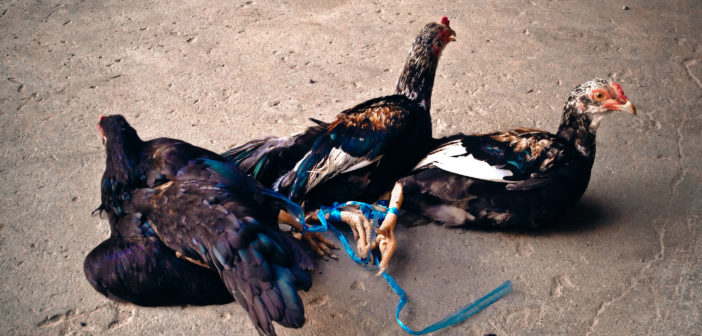Malaysians consume chicken meat and eggs on a daily basis, yet hardly a thought is given to the horrendous conditions in the modern livestock raising systems known as ‘factory farms’.
Malaysia is largely self sufficient in poultry meat production, with over 81% of the domestic demand for meat and more than 111% of the country’s demand for eggs met by the local poultry industry.
However, few consumers are aware of the way in which most eggs are produced. Hens are crammed into small wire cages, sometimes in tiers in dimly lit sheds, without access to sunlight or natural surroundings, so denied the ability to exercise even their most basic natural instincts. Such extreme confinement seriously restricts, or completely denies, the birds’ freedom to express natural patterns of behaviour.
Deprivation of basic needs and behaviours – such as walking, turning, exploring, interacting with or avoiding others, or being able to lie in peace and comfort – endangers the physical and psychological health of animals. Under such unnatural confinement the birds experience enormous stress, resulting in feather pulling and pecking. Beak trimming or debeaking is performed to prevent such acts of frustration.
Chickens are bred as egg producing machines, the aim being to obtain the optimum production from each bird regardless of her real welfare. And what happens to hens that no longer can produce eggs, after about two years in the battery cages? They are then sent to slaughter, to be turned into chicken soup, emulsified chicken products such as frankfurter and bologna, and canned products such as soups, sauces, stews and gravies. A tragic end for a hen who spends her life producing eggs to feed the masses.
The other way in which chickens are used is to produce excessive flesh for the meat industry. But how many know about the short and miserable lives of broiler chickens? Most commonly they are crowded and confined along with their waste by the thousands on tiny areas of land. Though not confined in cages, they also experience extreme confinement, poor air quality and stressful handling.
In addition to intense confinement, they are subjected to massive doses of antibiotics to counter their exposure to various viruses and bacteria via the manure and urine in their environment, which in turn grow ever more virulent and resistant to antibiotics.
When finally grown large enough, the birds are packed tightly into crates, stacked high on top of each other onto trucks, and transported over many miles through all extremes of weather, typically without food or water, to the markets for slaughter.
Consumers are unaware about such cruel practices, kept covered under the veil of secrecy that has long protected animal abusing industries. These industries operate outside the public spotlight, because people concerned about animal welfare would not accept the way they treat animals if they knew the reality.
Malaysia has the opportunity to lead the world when it comes to treatment of animals. Yet we are currently behind other developed nations, showing how clearly change is needed.
It is about time the Ministry of Agriculture looked into a Farm Animal Act prohibiting the rearing of birds in cages, crates or other forms of intensive confinement that violates the Animal Welfare Act 2010, and establishing best practices and increased regulations for animal welfare. Change is needed, not only for animals but also for farmers, who need to be able to plan for the future with certainty and confidence.
S M Mohd Idris
President
Friends of the Earth Malaysia (FOEM)
Penang
Featured image credit Pison Jaujip, CC BY-NC-ND 2.0





